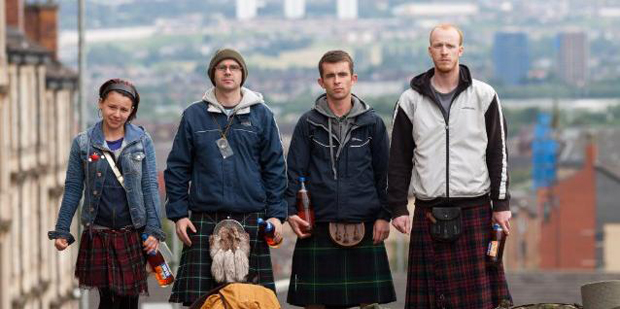Showing @ Filmhouse, Edinburgh, until Wed 20 Jun
Ken Loach / UK/France / 2012 / 101 min
The issue of a director’s unique style contributing to their own downfall is one which plagues modern filmmakers. Must they reinvent themselves within the framework of their own auteurism? If Wes Anderson and Tim Burton are quirky directors, is it enough that they include signatures in their work or must they evolve alongside society and cinema itself? The same could be said of Ken Loach, who retains the core magic of his ethnographic storytelling here, but loses most of it in weak metaphors.
As with countless other Loach films, The Angels’ Share tells of penniless Robbie (newcomer Paul Brannigan) who avoids a jail sentence ‘by the skin of his teeth’ and becomes father to a new son, Luke. With no job prospects and trapped in the violence of urban Glasgow, he pals up with three fellow community service workers to pull himself out by taking an avid interest in Malt Whisky.
So many aspects of this film feel typical of Loach: the dull colours found in his 80s TV documentaries; heroic working-class characters cast against dire backdrops reminiscent of My Name is Joe and Sweet Sixteen; the gentle but powerful Weegie patriotism which made Riff-Raff and Ae Fond Kiss so biting. The storyline in The Angels’ Share may seem fresh and unusual in that Robbie is discovered to have an exceptional nose for whisky flavours, but he’s similar to Loach’s earlier characters who share that type of poetic intelligence and expression which make them stand out in rank and file Glasgow.
These themes still resonate with a Scottish audience today of course, who appreciate the industrial history of West Scotland and have also aged alongside Loach himself, witnessing how digital technology and the Internet have not saved the younger, poorer generation. In that sense, modern Glasgow as portrayed here is visibly similar to the days of endemic imprisonment and rough council estates which Loach felt duty-bound to depict. His characters are still likeable, realistic and honest – and the film gives them that melancholic Scottish humour which always lightens the load on Loach’s emblematic seriousness.
In The Angels’ Share however, so much of Loach’s social-realist style is forfeited in favour of corny storytelling. The redemptive power of children and the value of friendship turn this film into a Frankenstein movie which awkwardly fuses buddy movie, quest and conflict/resolution narratives. There are a couple of total landmines which threaten to damage Paul Laverty’s occasionally squirmy script, such as when Robbie’s wife Leonie (Siobhan Reilly) explains that ‘the doctor said only fifty percent of Luke’s brain has developed, the rest is up to us’.
There’s also a case to be made that Loach is upping the jingoism to increase his reach, throwing in kilts, a trip to Edinburgh, scenes from the Highlands and obviously a central plot about whisky. It’s a dodgy wander towards populism which doesn’t cheapen the quality of the final product but rather sacrifices the clout which charged his films over the years. Just like the title – which references the small amount of whisky that vaporises in the cask – there is something lost in this film, perhaps as a result of Loach’s recurrent storylines which have ultimately started to threaten the potency of his commentary.


One thought on “The Angels’ Share”